
Deepti Chandani (Kanpur), Jeenal Kakka (Mumbai), Heemangshu (Delhi), Amit Kumar (Noida) and scores of students like them all over India have only one thing in common.
They are all employed or about to find employment. And they all only have a diploma.
Doors to fulfilling careers do get opened by just having a diploma, they claim.
What is important in commitment, skill, talent and aptitude. An iron-clad discipline helps. Read on to find out more...
Design, Fashion and allied functions
Design is an all-encompassing term though fashion remains the most visible outlet, from make-up to interiors to accessories to furniture.
The nature of skills is diverse and sectors which employ are plenty. Here is a lowdown on what it takes.
'Footwear design is 80 per cent science'
 Deepti Chandani
Deepti Chandani
Coordinator, development & commercialisation, Adidas, Gurgaon
Course: Diploma in Footware Design & Technology
Deepti Chandani was always certain of two things. One, she was not interested in engineering. Two, she wanted a seat in the leading fashion institute of the country. After completing Class 12 at the Seth Anand Ram Jaipuria School, Kanpur, the creatively inclined Deepti took a break for one year.
"I dedicatedly prepared for the institute's all-India entrance test," But despite her effots she did not make it. Today, sitting in her current office, Adidas, in Gurgaon, the 22-year-old harbours no regrets. "I joined the Footwear Design and Development Institute in Noida," says Deepti. She topped each year of her class and bagged the most coveted company as an employer. "
Programme highlights: The three-year diploma course at FDDI taught her that footwear is not merely a pair of shoes or stilettos but a perfect blend of art and science. The first year covers shoes, leather and foot comfort, the second year upgrades the student in areas of leather cutting, animal body, knives, machines, stitching and assembling of components, and the final year is about specialisation, either in merchandising, design or production.
"Research, technology, the material and the machine all goes into creating a single pair of shoes," she explains. No wonder footwear design is a highly-specalised skill and practical classes hold more significance over theory. Besides the fee, we also have to shell out extra for materials such as leather and other items," Deepti informs us.
Job profile: "Practice as much as possible, do not pass off your classmates' work as your own or take help from them all the time," advises Deepti. Currently working as Coordinator, Development and Commercialisation, Deepti will eventually move on to designing, having specialised in that area.
Progression to Head, Development takes place with in five to seven years, depending on one's calibre and output. The next level of growth for entry-level candidates such as Deepti would be Assistant Manager, Development. "Here one gets to handle categories such as running shoes, training or outdoor shoes," she explains.
Placements: "Students are snapped up during campus placements by companies like Louis Vuitton, Puma, Bata, Lakhani, Lotto among others. Tanneries and export houses, too, line up for candidates. For a burgeoning footwear market, entrylevel salaries range from Rs 20,000-25,000. The internship period is usually sans pay but provides ample ground for gaining rich industry experience.
 Diploma in Footwear Technology
Diploma in Footwear Technology
The programme aims to create manpower in the field of footwear production, design and merchandising to fulfill the demand of the rapidly growing international and domestic business. The course deals with all aspects of the business from production to servicing.
After completing the programme, students join as executives in product planning, quality control, product development, as merchandisers, footwear designers, range builders and category heads etc.
Further, if they so wish, according to their interest, students can do a PG Diploma in Creative Design and CAD/ CAM, or a PG Diploma in Management- Footwear Technology. Other than that, there are lots of certificate programmes run by corporate houses in footwear technology.
Students are placed in firms like Adidas, Tata International, Bata, Bazaar Connection, Franco Leone, Good Earth, Gupta Overseas, HiDesign, ITC, JPC shoes, JUMBO Electronics, Kabir Leathers, Lakhani Arman, Leela Trends, Levis, Mirza International, Mochiko, PUMA, Reebok, Shrubs Online, Virola International, Familiarity with the fashion industry, illustration skills, and broad knowledge of textiles, leather and materials and an understanding of shoe engineering are some of the baseline skills for becoming a shoe technologist.
Proficiency with computer-assisted design (CAD) programmes and modeling software is also useful. In addition, strong marketing skills, an ability for trend analysis and basic business acumen are important, especially for entrepreneurial shoe designers interested in starting their own footwear lines.
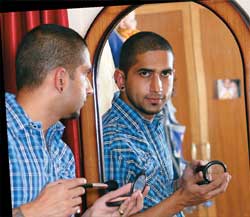
Heemangshu Bakshi
Make-up artist, Make-up Art Cosmetics (MAC)
Course: Diploma in Fashion and Media Make-up at the Pearl Academy of Fashion (PAF), Delhi
He once worked in customer services at a bank but secretly harboured a desire to open his own beauty salon. Today, Heemangshu gives makeovers, suggests beauty looks and products that will help his customers achieve their beauty goals at the MAC store in Noida.
Heemangshu's schedule at PAF trained him in all aspects of make-up: creative (for film, television, theatre), fashion make-up (for fashion shows/ photo shoots in magazines/ other print media) and beauty make-up (for the salon and bridal requirements).
As a make-up artist you could be working across media. Heemangshu recounts a special 15-day module by guest faculty K Mohan of FTII which covered scars, cuts, bruising and character make-up, for film and theatre make-up.
The 11-month programme comprising three semesters, packs in the basics of skin care, theory of make-up, and of course, practicals, which demand research, visualisation and execution of various make-up looks on a live model.
Placements: According to the institute, cosmetic companies such as Lancome and MAC come to campus for recruitments. Heemangshu was shortlisted by MAC after a personal interview. This was followed by a make-up demo and final interview.
Though Heemangshu currently works on the shop floor, the avenues open to him from here are store management, working on MAC events, fashion shows and photo shoots and finally, training.
Fashion gives individuality to every-day clothing
by Pooja Mishra for Careers360
 Shraddha Tanwar
Shraddha Tanwar
Fashion Designer, Virender Textiles, Gurgaon
Course: Advance Diploma in Fashion Design & Merchandising from Polytechnic for Women, New Delhi
About the course: The diploma gives exposure in areas such as industrial pattern, design techniques, sketching to name few. "We had to visit fairs and markets in the city to understand the kind of fabrics available, that were trendy," says Shraddha, who worked with Adigear International as an intern.
"The exposure has helped me understand the market trends and the industry better in my present job,"she says. About the job: "Working as a fashion designer at an export-oriented unit means constantly offering creative solutions as per the need; it keeps you on your toes," she says.
You need to understand the buyer's need in terms of fabrics, which is then arranged and designed. A photoshoot is organised, and images of these designs are sent to buyers for approval. Once approved, the order is placed, executed and then shipped off to countries like Italy, Germany, the UK and US.
Future growth: You can assist a designer, work as a fashion designer, a fashion forecaster, merchandiser and instructor at an institute or manage your own boutique. A fresher can earn between Rs 10,000-15,000 per month as a designer. This figure increase as you gain more experience
Carve out your own niche  Ashima Kapoor
Ashima Kapoor
Teaches make-up at PAF and is a freelance make-up artist and stylist in her own right
The demand for good make-up artists is only going to go up! Besides setting up your own make-up and hair studio, bridal make-up is big. You can also freelance with fashion magazines such as Elle and Vogue.
A fresher can start off with a salary of Rs 10,000 with a TV channel such as NDTV, Aaj Tak or Zee Sports, and cosmetic companies such as Lancome and MAC have hired our students with starting salaries between Rs 25,000 up to Rs 45,000.
For a freelance assignment, a fresher can earn anything between Rs 1,000 to 30,000, and a make-up artist who has managed to make a client base can easily make between Rs 10,000 and 2,00,000 a month.
Fashion your career goals
by Merril Diniz for Careers360
Design provides the backbone to a whole range of industries from textiles to furniture, and fashion is its most visible manifestation. Yet, footwear design (Deepti), make-up (Heemangshu), textile design (Shraddha) and other allied functions across sectors have opened more doors of opportunity.
A fashion merchandiser's job is to make sure that the most enticing clothes, shoes and accessories hit the store racks, keeping both pricing, quality and consumer tastes in mind. Visual merchandising involves everything from dressing up mannequins and using creative lighting in shop windows to preparing for promotional events.
Merchandising jobs are spread across domestic or international lifestyle/ fashion companies, ready-to-wear production companies, large retailers/chain stores and export houses/export fabrication companies (coordinating between the foreign retail stores and the production houses). A merchandiser can even work closely with a fashion designer to come up with a new product, and eventually progress into fashion retail management or set up his/her own export house.
Typically, fresh recruits can start with a salary of Rs 10,000 upwards. With experience and if you are creative, this figure can rise to Rs 30,000- 40,000 per month and beyond. Fashion retail management involves managing stores, departmental stores, boutiques, clothing wholesalers, importers, designers and manufacturers, so as to meet company targets.
A diploma in fashion merchandising/ retail management prepares you for entry-level positions in both these areas, as well as profiles such as Buyer, Shop Floor Executive, Retail Sales Executive, Retail Representative, Fashion Forecaster etc.
In footwear design, rapidly growing domestic and international companies need professionals with creativity, specific design skills and an understanding of the industry. FDDI's diploma in footwear design and technology prepares students for a career in footwear production, design and merchandising. Freshers can start with a salary of Rs 15,000 upwards. Job areas include Planning, Quality, Merchandising and Range Building.
Leather and accessory design is yet another growing area and needs creative, trained professionals in functions such as Manufacturing and Production Technology, fashion and trend forecasting and analysis and marketing.
FDDI's diploma in leather and accessory design trains students in crucial areas. Freshers start with a salary of Rs 5,000 upwards, and job functions include design, merchandising and production. According to FDDI, companies such Da Milano, Diesel, Levis, PUMA, Reebok and Woodland have hired their students.
Make-up artistry shows great potential if you have what it takes: a keen interest, a creative streak, the ability to pay attention to detail and swearing by the highest standards of hygiene! PAF's make-up diploma programme currently accepts only 23 students, as they have only 23 make-up stations. But the demand for good make-up artists will only go up.

The monitor flickers relentlessly, the mouse gets whimsical and the CPU makes a strange sound! It's time to call Mr Fixit, the computer hardware engineer.
Unlike the software field, computer hardware is all about the architecture of the device. This includes configuration, troubleshooting and maintenance, assembly and dismantling of the components besides networking rchitecture and overall security system.
Entry level: The minimum educational qualification required for a programme in IT/ Hardware engineering depends from course to course. An institution which confers short-term certificate course (of six months) or a diploma (of 12 months) sets the eligibility as 10+2.
Opportunities do exist for higher studies in this sector, but are not essential for the first job.
Course content: This includes understanding computer components, diagnosing problems and troubleshooting them. Fixing, repairing, replacement, upgradation and installation of the device are the major thrusts in learning.
Students are also trained in leading operating systems like Unix, Windows 2000 and others. At higher levels, students gain expertise in Local Area Networking and Wide Area Networking respectively.
With increased instances of security breaches in corporate functioning, now the concepts of security configuration and firewall data also find elaborate mention in the curriculum.
Job responsibilities: "LAN performance, adding/deleting users, adding servers, creating backup of critical data are some of the task that a fresh engineer is assigned with," says Prakash, an engineer working with HCL.
In the next stage of job growth, a responsible candidate would be assigned with tackling of advanced TCP/IP, security fundamentals, security implementation and router security to safeguard corporate information.
The stages of growth, broadly moves from being an engineer to senior engineer and then on to server administrator. "Next stage is off-site or on-site manager/project manager and then a consultant," says Prakash.
All companies need IT/hardware engineers. Multinational companies as well as IT companies have in-house employees who are responsible for security and maintenance of the systems. Some large recruiters include Google, Wipro, Tata Consultancy Services, Citibank, Mercer, Agilent Technologies, General Electric and HCL among scores of others.
Other requirements: It is widely perceived that an engineer's job is not in the frontline and therefore communication skill is not significant. However, this notion doesn't hold much ground in today's job market. In current context, engineers' interface with customers is frequent and ever expanding.
Therefore, engineers who are proficient in conversing hold a definite edge over their co-workers. Ambitious candidates also keep their employability levels high by pacing up with technological advancement. Any other qualification like vendor certificates like Microsoft's MCSE or Cisco's CCNA or CCNP or CCIE, or Novel's CNE or Sun Microsystems' Sun Solaris Administrator adds to an engineer's profile.
But remember as you move up the scale it is the skill that matters more than the certification.
Fee versus salary:
- A diploma holder starts with an average income of Rs 7,000-10, 000.
- The average fee at established institutes is between Rs 20,000 and Rs 50,000.
- Aptech's Diploma in Hardware & Networking (N-power) programme is priced between Rs 20,000-40,000 (depending on the city) whereas a 36-month programme of GNIIT is pegged at Rs 1.5 lakh.
- Some institutions provide a value-add; GNIIT for instance, enables students to take admission to Semester 3 or 4 of BSc (IT) and BSc (ITIM), where degrees are awarded by Kuvempu University, Karnataka.
India needs 50 lakh computer professionals
 Ravinder Goyal
Ravinder Goyal
Director, IACM
It is expected that by 2012, there will be a demand of over 5 million computer professionals, as per a recently concluded IDC-NASSCOM McKinsey survey. Today, even an organisation having five employees can't function without networking support.
A network engineer must be capable of implementing, administering, maintaining computer Hardware, Networks and overall Security Systems. He or she will be able to manage and troubleshoot computer hardware and LANS, administer and configure different kinds of servers, implement and manage CCTV, Biometric, smart Access Control Systems and RFID devices and maintain access control systems, manage Intruder Alarm and Building Automation and prevent and manage fire through Automatic Alarm Systems and much more.
After completing the programme a student can work as a Trainee Engineer in the field of Hardware, Networking and Electronic Security at a starting salary of around Rs 5,000-10,000. He can grow as Server Administrator, Network Administrator, Security Manager, Project Manager, Infrastructure Leader and a Technology Consultant.
With a starting salary of around Rs 5,000-10,000 at entry level, a student can reach up to a salary of Rs 12 lakh per annum in a span of around 8-10 years.
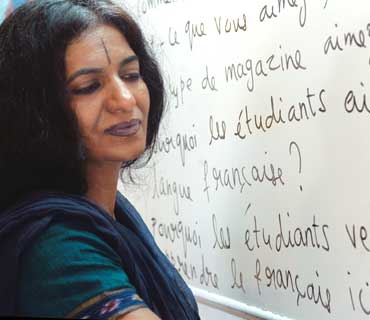
Learning a foreign language was earlier seen as a hobby. But today, youngsters are opting to learn Spanish, French, German and Italian, to name some of the popular languages, for full-time careers. Arabic, Persian, Portuguese, Chinese, Japanese and Russian, are a few more.
Learning centres: Jamia Milia University's Faculty of Humanities and Languages, the MMAJ-Academy of Third World Studies (MMAJ-ATWS) offer courses in the various languages, as well as Delhi University.
Students can also opt for a diploma in foreign languages from recognised institutes such as Alliance Francaise (French), Instituto Hispania (Spanish) and Max Mueller Bhavan (German), to name a few.
Undergraduate courses in various languages are available in JNU, University of Pune, University of Delhi, EFL university Hyderabad, admission to which is through entrance tests.
Job opportunities: These courses not only offer career options in translation and interpretation but also in teaching and in research (university and school teaching) in India and abroad. Students can get government jobs through UPSC, print and electronic media (All India Radio has foreign language services), Indian Armed Forces, RAW, paramilitary forces, embassies, multinational companies, call centres, tourism etc.
Pay package: While interpreters charge Rs 1,000 per hour to Rs 25,000 a day, translators earn on a per word basis (ranging from 60 paise to Rs 5 per word).
Foreign language professionals are also needed by the IT and offshoring industry, primarily for jobs involving collection of information, working on foreign language documents, voice-based tasks, training, transaction and migration processes, quality management etc.

Acting and direction are the more familiar and popular aspects of media industry. But besides these two, there are several areas in filmmaking and production that can get you a lucrative job.
Overview: A film, news programme or television soap opera, are all collaborative efforts by a team of skilled and talented professionals. In addition to directors and actors, there are editors, sound recorders, cameraman, lighting experts, composers, cinematographers, graphics expert, animators, screenplay writers, anchors, set designers, photographers, to mention a few, who work together to make films, serials or information-based programmes.
It's a vast field and opportunities are immense and the good part is that most of these skills can be learnt in a short duration.
Eligibility and course area: For most technical courses basic eligibility is 10+2.
Job prospects: Film studios, production houses, market research companies, buying companies, entertainment channels, news channels, radio stations etc.
Remuneration: Earnings vary depending on the chosen field and work experience. The starting salary could range from Rs 15,000- 60,000. There are quite a few institutes in the country such as the Film and Television Training Institute, Pune, (FTII), Asian Academy of Film and Television, Noida, Whistling Woods International Institute, Mumbai that offer a number of courses that you could choose from.
Certificate courses are 6-8 months while diploma course are of one year. Of course, you have to be prepared to slog it out, as it is a very competitive industry. But opportunities are many.
Some of the training institutes have a good placement record and news channels and production houses visit them for recruitment. The Indian media industry is evolving rapidly and there's a dearth of skilled people says Gurbir S Grewal, Jt Director, Asian Academy of Film and Television, also director of the film Coffee House. But be prepared to start from the bottom, he says. After that, the only way is up, he adds.
For a slice of Bollywood
If you have passion and are willing to work hard, then your dreams are about to come true
 Abhinav Varun Revis and Amit Kumar Singh
Abhinav Varun Revis and Amit Kumar Singh
Post production, editing
Course: Diploma in Post Production/Editing at Film Training Institute
Abhinav Varun Revis and Amit Kumar Singh are two bright young men who from early on were clear they wanted to be a part of the media industry. So right after 10+2, they enrolled themselves at a film training institute in Noida.
Abhinav, 19, is doing a one-year diploma in Post Production while Amit, 19, is pursuing a one-year diploma in Visual Communications. Abhinav's mother wasn't too pleased with his decision to become a film editor.
"My mother works in a government hospital, so she thinks a full-time graduation and a job that pays at the end of every month is more sensible." He's studying BCom (Honours) through correspondence, not ignoring his mother's concern.
Amit, too faced a similar challenge. In his case, his father, a marketing executive with Unilever, in Bihar, didn't approve of his choice. "But he came around when he saw my pictures in an ad for a cement brand. The billboards were all over Bihar," says Amit, who while modelling discovered that his strength lay in direction.
In post production, Abhinav is studying sound recording, sound editing, video editing, graphics and advanced editing. "Editing can make or break a film: it can enhance a scene, make it more dramatic, more thrilling or completely kill it if the editing is sloppy. Of course, one has to be talented, but technique helps polish the talent," he says.
Amit, on the other hand, is learning about all the elements that go into making a film like editing, sound, acting, art direction among other things. In another six months, Abhinav (he's already halfway through his course) would be job-ready. He's confident that his editing skills will fetch him a job that pays at least Rs 20,000.
Amit cites the case of his friend who joined a television channel a few years ago as a cameraman and is drawing upwards of Rs 50,000. But making up your mind about your career isn't an easy decision especially right after 10+2, so Abhinav's advice to all those just starting out in life is that no matter what you do, don't lose your originality.

A methodical understanding of high-tech instrumentation, specimen and tissue analysis and your acumen in interpretation of results are some of the core professional responsibilities that you would associate with, as a trained medical laboratory technologist. Though you will work independently, most of the time you would be an important part of a healthcare team.
The MLT diploma programme enables you to work in hospitals, public and private clinical laboratories, ambulatory healthcare services, blood and organ banks, out-patient care centres and laboratory instrument sales and service firms.
A further specialisation could open opportunities for you to work in research, forensic, pharmaceutical and industrial laboratories. Whilst selecting the institution to pursue a course in MLT, look for a place where the instructors are certified medical lab technologists themselves.
Secondly, see if the institute offers compulsory clinical placements for practicum to all students. Rakesh Kuma, a student of the DMLT in Kerala, says, "The theoretical concepts during the course work appear unclear but get crystal
clear once they are explained during experiments."
 Job functions: One conducts a variety of specialised tests using specialised tools and techniques primarily to help
Job functions: One conducts a variety of specialised tests using specialised tools and techniques primarily to help
physicians and medical doctors diagnose, treat and prevent diseases. The work also includes preparing specimens for analysis, testing blood, body fluids, etc and to interpret the results.
Entry-level salaries and placement: In this sector, the salaries vary a lot and depend on the hands-on experience of the candidates. Perhaps this is why doing an intense internship in a good institute matters. During internship one may get anywhere between Rs 4,000 Rs 7,000. After the training period, one may get a salary in the range between Rs 6,000 and Rs 15,000.
Both government and private institutes offer diploma in MLT and apart from the government hospitals, nursing homes and health centres, there are private organisations that recruit directly from these institutes. For instance, the Asian Institute of Health Sciences, Thane has placed its students in Sarla Blood Bank, Bhakti Vedanta, Sanjeevani Blood Bank to name a few.
Similarly the students at the Institute of Paramedical, Management & Technologies, New Delhi, have been recruited by hospitals like Hindu Rao, Apollo, BL Kapur and Rajiv Gandhi Cancer Institute & Research Centre as also companies such as Ranbaxy.
What next: Experience makes you learn a lot and one may continue to gain expertise in the same domain keeping in pace with the latest technological innovations and novel techniques. One gets an edge, if the candidate specialises in microbiology, hematology, biochemistry and histopathology.
According to Fehmida Shah, Principal, Government Polytechnic for Women, Bemina at Srinagar, "After completion of diploma, one can also go for some short-term courses like histopathology or microbiology or still better, can upgrade to specialisations in a single stream like clinical biochemistry, microbiology, biotechnology, immunohematology (blood banking), cytotechnology, nuclear medicine, clinical pathology etc."
As a diploma holder, often people scale up their experience by pursuing BSc in Medical Lab Technology. There are other diploma holders who pursue a management programme in Healthcare Sciences. Later in their career, one can be incharge of a laboratory or a manager in a blood bank or in a related functional discipline in hospitals.
'We help in diagnosis'
Shalini Dixit currently works as lab technician at Apollo Hospital, New Delhi
Course: Diploma in Medical Laboratory Technology, Institute of Paramedical, Management & Technologies, Delhi
Conducting experiments give Shalini a sense of joy, when she recollects the hours spent in her school's science laboratory. Her interest prompted her to move closer to life sciences and brush up on analytical skills by pursuing Medical Laboratory Technology.
According to Shalini, "Lab technicians can be rightly called 'detectors' who diagnose a disease. For instance, we identify cancer cells, heart disease, diabetes and many other health conditions. Finally, we generate data and send it to doctors to review it."
This involves examining and analysing complex, biological, hematological, microscopic and bacteriological tests.
About the course: At the institute, during theory classes at times concepts would appear ambiguous to Shalini. But these concepts became clear when explained during experiments. Labs give scope to make mistakes and you learn from them.
"Along with the practicals and classroom sessions in life science, we also studied statistics, mathematics and chemistry. In addition, the three-months internship programme at K G Hospital gave me a good insight of the profession" she said.
Getting a job: She herself applied at Apollo hospital and was selected on the basis of a written test (technical) followed by an interview. She says "typically, a diploma holder can earn anywhere between Rs 6,000 to Rs 14,000. Pay scale may rise depending on your academic record and experience in the field".
On the job: "Much of the time is spent standing in the laboratory or taking rounds of the hospital. The nature of work involves two functions. First, permanent foothold in the laboratory where samples are received and put into testing. Second, rotating shifts in a day demands collection of blood samples of the patients from the specific wards (OPD,
IPD etc). This method is called Plebotomy. To do this, I try to create an atmosphere of trust and confidence with
patients while drawing blood specimens in a skillful, safe and reliable manner," says Shalini.
(As told to Shiphony Pavithran)
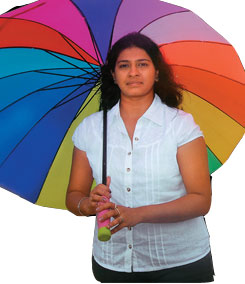
Jeenal Kakka, a peppy 26-year-old, believes in following her heart when it comes to matters concerning her job. Unusual as it may sound to many, Jeenal, after finishing Class 12 at St Agnes High School in Mumbai, left a Bachelor's programme to enrol in a diploma course. She first joined the Nirmali Ketan College of Home Science, but within 14 months Jeenal realised that her five-year degree course in kitchen science did not interest her; it neither suited her temperament nor aptitude.
So, the Mumbai girl dropped out to pursue a one-year diploma in Travel and Tourism at the Kuoni Academy. "I love travelling, and am an adventure freak!" she says explaining her choice.
Add-on programmes: Alongside the diploma, Jeenal also completed the International Air Transport Association (IATA) programme, a four-year course by Kuoni Academy on airticketing.
She strengthened her knowledge in the travel/ tourism domain by also undertaking a one-month Swiss Tourism training programme.
"In the travel business, one has to know the places well," she says. The cost for all three programmes completed in a span of one year: Rs 1,16,000. While doing the undergraduate programme, Jeenal also pursued a Bachelor in Arts from Mumbai University.
"Though in this sector, experience counts more than having a bachelor's de gree. I did my BA to keep my options open for further growth," she adds.
gree. I did my BA to keep my options open for further growth," she adds.
Job profile: Jeenal joined GoGoa.com through campus placements. The 10-year-old company specialises in Goa tourism. "Recently, the firm also ventured into Mumbai tourism and has launched a website, Mumbaistopover.com," she apprises us.
Jeenal, who joined as an executive sales officer, coordinates with hotels and the clients for their travel and accommodation arrangements.
Pay package: Into her job for three months and Jeenal received a raise of Rs 2,000. "My current salary is Rs 11,000," she says. Isn't it low for a city like Mumbai, we wonder. "The starting salary in this industry is between Rs 6,000-9,000," she informs us, having applied to established travel firms like Thomas Cook, Cox and Kings and Kesari Tours.
The extended work timings were another deterrent. GoGoa suited her fine on both the counts.
Growth prospects: Jeenal maintains that getting a job in travel and tourism is not a tall order. But one needs refined communication skills as interaction with clients is a lot in this field. "One has to be a good listener, too, that's what my training taught me," she says.
An undergraduate like Jeenal can rise to the level of a tour operator, which involves planning end-to-end itinerary of a client along with cost details. The profile further up the ladder is Manager, which involves handling special customers and hotels.
"With my IATA experience backing me, I plan to open up my own travel agency one day," Jeenal says.
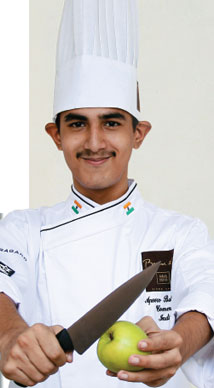
Every year, the hospitality industry needs 2.03 lakh skilled professionals and with the Commonwealth Games just round the corner, the demand for hotel management professionals has surged.
RK Gupta, senior lecture at Institute of Hotel Management (IHM), Pusa, says that applications for short-term, skilled-based programmes have gone up by 10-15 per cent. There are four major functions in the hospitality sector, these are: Food Production, Food & Beverage Service (F&B), Front Office, and Housekeeping.
Food Production is all about cooking different kinds of cuisines, baking cakes and pies and presenting it aesthetically. Food & Beverage Service (F&B), is about taking the guest's food and drink order, ensuring that the guest is received and looked after well. Front Office welcomes a guest and ensures a hassle-free stay at the hotel. Front Office is a popular subject choice for students as there are greater job opportunities in this area. Housekeeping ensures the guest feels at home in the hotel room.
Besides, the wellness industry (that includes spa and fitness) is becoming a popular service in hospitality and offers plenty of job opportunities in hotels, spas and health clubs.
The work a chef or managing a hotel may seem glamourous, but the working hours are long, and the job is very demanding. But it is also an industry that grooms you, polishes your communication skills and teaches you hygiene and trade skills, besides providing you with a very refined working environment, points out Gupta of IHM.
Hotel management institutes across the country offer certificate and diploma courses. While the duration of certificate courses is less than 12 months, diploma courses are a little over a year. In fact, the National Council for Management and Catering offers around eight courses in hotel management.
From craftsmanship course to culinary Olympics
The hospitality industry has many job options provided one is willing to work hard
 Apoorv Bachchan
Apoorv Bachchan
Trainee, ITC Maurya Sheraton
Course: Craftsmanship course in Food Production
Apoorv Bachchan is all of 17 years old and he is already on the job. "Food has always interested me and I thought, why not plunge into it right away rather than wait for another three years," he says.
Apoorv enrolled for the course at at IHM. "I want to become a chef," he says as he stands in the ITC Maurya kitchen in a crisp white chef coat and pant (the uniform of a trainee). At IHM, he's learnt to cook almost everything but his favourite cuisine is Continental.
During his first foreign trip to Shanghai, Apoorv represented ITC Maurya in Bocuse d'Or, the World Cuisine Contest, also considered the culinary equivalent of the Olympic Games. He was one the three persons representing ITC.
"I was working along with Manjit S Gill, Corporate Chef of ITC-Welcomgroup," he says with stars in his eyes. Sadly the team did not win the contest. "We made steamed halibut, a fish, with preserved mangoes." The judges did not have a taste for Indian food, he reasons.
Now back in New Delhi and to the 10-hour grind of a trainee's life, Apoorv remembers his Shanghai trip as fun and a learning experience. Even now, there's so much to learn he says besides cooking. Many join the industry for the glamour, but he makes it clear to all aspiring chefs and managers that there's almost no social life in this line of work, and there are no holidays!
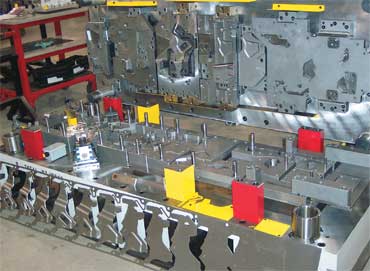
It is the mother of all manufacturing and deals with moulds, jigs and fixtures, plastics, die casting, dies and so on. "A three-year diploma is a crucial component in a one-year in-plant training programme," says S Sahu who did this course from IGTR Aurangabad.
Job prospects: Across manufacturing sectors you begin as a technician. Quite a few tool and die makers become tool
designers. Some open their own tool and die shops.
Pay package: Well-trained tool and die makers can command very good salaries. The starting salary is anywhere
between Rs 6,000 to Rs 26,000 per month. Ranjeet Prasad Singh who passed out in 2006 from the Indo-Danish Tool Room at Jamshedpur and is currently a Design Engineer at Tata Technologies, says, "DTDM is a job-oriented course, much better than other polytechnic/ diploma courses. The students are practically highly skilled and do not shirk hard work. It is a collective effort," says Sahu.
Training: Most of the institutes offering diploma in tool and die making are in the government sector. Set up to fulfil the tooling and training needs of the micro and small industries, we present a list of these institutions and their relevant details as a course listing.
The challenge here is that due to the extensive training required, very few people enter the field and the employers do face difficulty in recruiting qualified candidates.
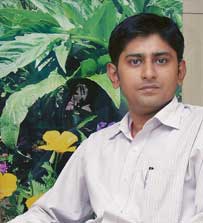
A diploma in Office Management and Secretarial Practice (OMSP) open doors to job profiles such as executive assistant, personal secretary, administrative officer/ assistant, "Students get more exposure through our full-time training," says F Shah, Principal, Government Poytechnic for Women, Srinagar.
Course curriculum: Course modules include introduction to communication methods (written, verbal), language exercises, report writing (English), note making and minutes writing, composition and grammar. Typically, good faculty focus on skills like phonetic transcription, stress and intonation in communication and presentation practices.
The students are taught book-keeping and accountancy, company law and banking services. Practical lab sessions and
field exposure are both extremely crucial for the students.
Job skills: Apart from good communication skills, these skills are a must: letter writing, precis writing; procedure of preparing memorandum of understanding, tax regulations, effective documentation, updated computer packages and
their applications and such functions.
If one is organising the boss's routine work, one should be aware of schedules, time tables, travel agencies and associated tariffs related to the nature of work.
Professionals on demand: Of late there has been a steady demand of qualified office managers, secretaries, customer care representatives in MNC, public sector companies, hotels etc. Your workplace could be a public or private sector enterprise, corporation, service sector establishment such as a bank, financial institution, logistic units/firms or a travel agency.
Campus placements: Most institutes, private in particular, offer placement assistance. The entry-level salaries range from Rs 8,000 to 20,000 depending on the place of work and the city. But a lot more depends on your own ability and
experience.
Confidence, experience got me the job
Ashish Kumar
Assistant Executive, ONGC
Course: Diploma in Office Management & Secretarial Practice from YMCA, Delhi
Ashish left Sahibganj, a small town in Jharkhand and came to Delhi, to pursue his corporate dreams. He began working in the HR division at a global consultancy firm, where he screened job resumes.
"I realised I had good organisational and communication skills," says Ashish. And to help groom them further, the one-year diploma in OMSP by the YMCA, which cost just Rs 30,000 was perfect for his pocket.
He attended a three-hour class in the morning and rushed to the office thereafter. The course taught him business communication, application of information technology and the latest computer packages, principles of accounting and finance, the nuances of organisational behaviour and human resources, and different approaches to sales and marketing.
A campus placement at JIMS (a management institute) by the YMCA, helped him gain experience and knowledge about secretarial practices. When he applied at ONGC for a job as Executive Assistant, the competition was fierce. "I believe what made me stand out was my fluency in communication, confidence and experience."
Ashish is now Assistant Executive to the CTO (Technical Marketing Department). His profile comprises a wide range of duties, which must be performed on a daily basis.
(As told to Shiphony Pavithran)

One of the most-sought-after jobs of the 21st century, animation, can be defined as the art of breathing life to a character or an object. A blend of entertainment industry and technology, it is concerned with design, drawing, layout
and production of graphically rich and attractive multimedia clips.
Aptitude and skills: You need sketching skills and a passion for animation. For better job prospects, a degree or diploma in animation helps. Arena Multimedia offers diploma courses in animation after 10+2 across 80 cities including one that is exclusively focused on animation film-making.
A two-year diploma in 3D Animation at Maya Academy of Advanced Cinematics is also available. Mumbai-based Toonz Academy offers a one-year advanced diploma in Digital Arts and Animation validated by the European Carolus Magnus University, Brussels.
Jobs galore: India has more than 300 animation studios, which employ over 15,000 animation professionals. The gaming industry is one of the top employers and they also pay quite well. Though entertainment through film and television is the main area of application in this profession, animation is also needed in other areas such as business, sales, engineering, education and advertising.
Animators can also find jobs in print media and publishing firms. Freelance work is another option, particularly for web animators. Animators can also branch into website design, CD-Rom production, graphics designing and three-dimensional product modeling.
Salaries: Junior animators or trainees could get between Rs 8,000-15,000 per month. With three to five years experience they can earn Rs 25,000-40,000. A well-experienced animator who has a good portfolio of excellent animation work could easily get Rs 50,000-60,000 per month.
With US and European studios outsourcing work to India, and Indian companies creating a number of animated films and cartoons, the future looks bright for creative animators.
Animation: the next big industry after IT in India
 Ninad Karpe
Ninad Karpe
CEO & MD, Aptech
Animation is multi-billion dollar industry has generated great employment scope, and offers career opportunities across a range of profiles -- from technology-based jobs such as scanning, compositing, digital ink and paint, and game designing to creative guys like visual-effects supervisors, 3D modellers and character animators.
Training is the most essential and important aspect for the creation of a skilled professional in the field of animation. To become an animator, the first step is to join a diploma course in animation. There are various diploma courses to choose from like, diploma in Graphic Designing, Web designing etc, which can help master the suite of technical skills required to pursue a lucrative career in this exciting and dynamic industry.
The curriculum for diploma courses are designed in such a manner that over a course of time students get a thorough grounding, expert training and certification in his/her desired topic of specialisation such as Modeling, Lighting, Rigging, Animation, Visual Effects etc.
A student pursuing a diploma course in animation and gaming can pursue job roles such as Graphic Designer, Web Designer, 2D/3D Animator, 2D/3D Designer, AV Editor, Technical Trainer, 3D Modeler, Multimedia Programmers,
Compositors, Visualisers, Content Developers and Pre and Post Production executives in leading animation studios
and entertainment companies.
Students get placement assistance from the institute. Most good institutes offer job placement assistance to help place students at leading studios in India and abroad. Arena has placed students with studios like Prime Focus, Toonz Animation, Zee TV, Colour, Google India, NDTV, Discovery Channel etc.
Beyond a diploma, if a student wants extensive technical training and specialisation skills in animation, he can opt for an optional degree programme. An aspirant wishing to pursue a career in animation and gaming can start with the average salary of around Rs 1.2 lakh per annum and can reach up to Rs 7 lakh per annum (depending on the different profiles an individual chooses).
It is rightly said that animation is a career where one can literally 'draw' ones salary.
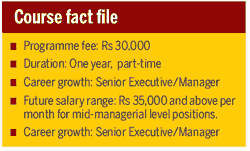
With conferences, celebrity bashes, fashion shows and corporate events being the order of the day, event management
is almost a sunrise industry.
Training for the job: You do not need any special qualifications; the only prerequisite is to have excellent interpersonal skills. Today the National Institute of Event Management, Mumbai, International Institute of Event Management, SNDT Women's University, Mumbai and National Academy of Event Management and Development Mumbai, offer postgraduate diplomas in event management.
Course curriculum: EMDI's diploma in event management covers event branding, writing an event brief, production
and technical, celebrity and artist management, types of media, creativity in events, event sponsorship, PR with context to events, in-film marketing and promotions, wedding planning, award ceremonies, entrepreneurship etc.
Career options: An event manager is expected to conceptualise for the occasion keeping in mind the requirements and objectives of the client, planning, coordinating with different agencies, seeking permission from various government authorities, visualising stage design, arranging performers and media promoters for the event, as well as.
One can start out by working as a manager in an event management company. Those experienced can also work as a consultant in corporations overseeing the entire operation. Those who have an entrepreneurial bent could also set up their own event management firm.
Pay package: High performers are paid handsomely. While a fresher may have to start with a lower stipend at Rs 10,000-15,000 initially, the opportunities for growth are tremendous and within a couple of years one can command as
much as Rs 1.5-2 lakh per month.
'I really enjoy all the backstage action'
by Urmila Rao for Careers360
 Mazhar Ladji
Mazhar Ladji
Event Management Executive, Shobiz Experimental Communications
Course: Diploma in Event Management
It was the year 2007, when 18-year-old Mazhar was mulling over his options after Class 12: a vocational course versus a graduation degree. Just then, a friend approached him for help with an event he was planning; the high-voltage MTV Lycra Awards. He agreed to assist his friend, the MTV show was a success, and set the stage for Mazhar's future career path.
Managing a high-profile event packed in all the punch that he spontaneously enjoyed executing. "I had prior exposure in the event handling too with a Stardust event award show," he adds, "and I enjoy all the backstage action." So, the student of Lala Lajpat Rai College, Mumbai, enrolled at event management institute EMDI, attending classes from 6-8 pm, and pursing his a BCom from his alma mater in the morning.
The one-year diploma cost Mazhar Rs 30,000. The programme curriculum includes all aspects related to managing an event. "Besides technical, sound and lighting knowledge, we were introduced to aspects of production, execution and client servicing," says Mazhar.
The internship period comprised working on diverse events right from Bollywood shows to the International Jewellery Show and celebrity weddings. "Each client is different and has to be tackled accordingly," he says. A big event may warrant 10-15 meetings with clients before and during events, to meet demands flawlessly.
Pay package: A two-month internship at Seventy earned Mazhar Rs 12, 000. Now working at Shobiz Experimental Communications, a prominent event firm in Mumbai as an executive, Mazhar is on probation, and currently draws a salary of Rs 10,000 per month. Between 2008 and 2010, Mazhar also freelanced with event management firm Encompass.
Growth prospects: In this field, your ability to understand and grasp the nuances will pave the way for growth. "Faster the understanding, more rapid is the growth," says Mazhar. One has to plan events well in advance to avoid exigencies, he adds.
However, patience with clients is a must, as is keeping 'Plan B' ready at all times. One can be promoted from executive to senior executive and work your way up to manager and lead a team. A mid-level executive can hope to earn Rs 35,000 and above.